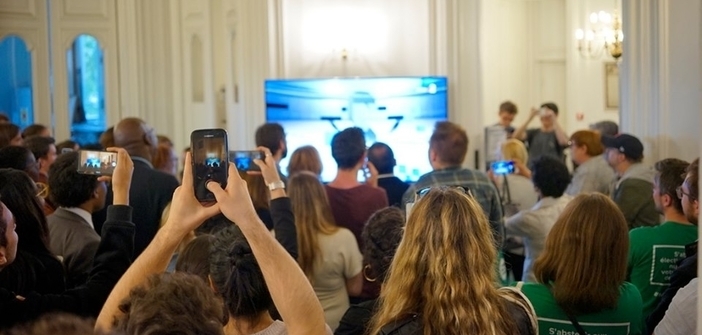Following the results of the European elections on May 26, we met with Enzo Gallet, General Secretary of the Young Europeans – Nice, to discuss them. The Young Europeans association brings together young people aged between 18 and 35 who are eager to promote European integration and bring Europe closer to its citizens.
What is the primary motivation of the association?
The Young Europeans is a national association that seeks to promote a more federal Europe. We particularly address young people. We leave it to the citizens to choose the ideas regarding this notion of a “more federal Europe”. We are in favor of a stronger, more united Europe and a new step in European integration.
What is your approach?
Against euroscepticism, we encourage people to be more euro-critical. We promote what Europe is already doing, whether it’s in ecology or universities. In fact, everything that touches the competencies of the European Union and subsidies. Often, people are unaware of its role. Sometimes, we invite them to try to imagine what France would be like without Europe; without the single currency, or agricultural subsidies, for example. It’s a very difficult exercise, but it helps people realize that without Europe, we would not be where we are today.
A few months before the elections, did you run a campaign to encourage voting?
We conducted our own campaign with the hashtag #MyVoteMyEurope on a national scale. The idea was to fight against the first party in France, which is abstention. Our message was simple: If you want to change Europe, then go vote. With 34 lists, I believe people had plenty of choices for a vision that could resonate with them. This fight against abstention was quite successful, with a 22% increase in votes compared to 2014. We are quite proud.
How do you explain that one out of two citizens doesn’t go to the polls?
I personally think that Europe is underrepresented in the media. This creates, for many, a high rate of abstention and disinterest in Europe. There’s a lack of information, as we saw with the vote that took place last Sunday. BFMTV had fun writing an article where they observed the statistics of the second round of the 2019 European election. We still have progress to make. We obviously regret it, but we are doing our utmost to communicate a bit more. The media in France do not talk enough about major issues, for example with the ban on single-use plastic. It was mentioned but not enough.
Were you surprised by the election results in France?
Regarding the results, there were polls, and as I study mathematics, I understand the margin of error. We knew that abstention would be lower than in 2014, but there were still surprises. For example, with Europe Ecology – The Greens, even though the movement was anticipated. The same applies to the Republican Party, which dropped below 10%. As for the National Rally leading, statistics and polls had already shown it ahead of La République En Marche.
At the level of the European Parliament, can we expect a change in the representation of majority parties?
Yes, totally. For 40 years, the EPP (European People’s Party) has been in power. For the 2019 election, we reversed the trend of abstention and they are likely to lose the majority in Parliament. The centrist group will be dissolved in favor of a new one and might attract the Portuguese socialists and the Democratic Party. The latter scored well in Italy. There will be major changes in Parliament.
Will the rise of certain skeptical or very critical parties change anything in the parliamentary process?
It’s worth noting that the National Rally scored lower than in 2014. Furthermore, when the UK leaves the EU, the NR and LREM will have the same number of MEPs. In Italy, however, Matteo Salvini’s party achieved a higher score. In the end, apart from France and Italy, the far-right isn’t more popular than in 2014. Anyway, if they maintain the same habits, which is a tendency to divide, generally it won’t pose too many problems. I really don’t think that in the European Parliament, major issues will revolve around far-right parties.
What will the main issues be, then?
We are seeing the domination of the EPP by German MEPs; one might wonder if the situation will evolve with the new centrist group, which is likely to become the majority. I am quite optimistic about what can happen in Parliament. We are witnessing the destabilization of a situation that has been stable for 40 years. In any case, our association will always be there to insist with parliamentarians on advancing European integration and more federalism.
Isn’t it a contradiction that the National Rally, a party critical of Europe, is so well represented in Parliament?
We also have a very critical view of the European Union and its institutions. We would like it to change, of course, as Young Europeans. If I am involved in this association, it is not to be political but to promote Europe. Now, if the National Rally has good ideas, we’ll take them, and if they don’t, we will be critical. We do it with all parties, without distinction.
There’s often a clash between lobbies and MEPs; will the relationship change, particularly regarding environmental matters, with the increased presence of ecologists?
I believe that in the European Parliament we overestimate the power of lobbyists. Indeed, Brussels is the place with the highest concentration of them after Washington, but they are highly regulated, and we know which groups they will interact with. Brussels is very strict regarding lobbies. I think the Greens will implement their program, and their numbers reflect a greater force of influence.
What are the next major European projects?
The Renaissance list wants to have the Climate Bank voted on as early as next week. We’ll see how that goes. I think it will be the first major project of the European Union after these elections.


